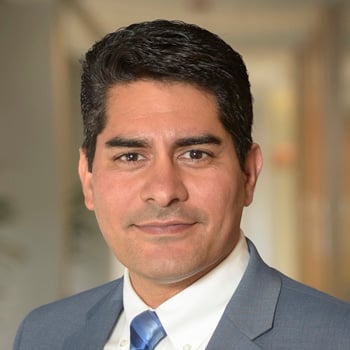Medical students are the next generation of medicine, and leadership is required to move the profession forward. A recent event at Northwestern University Feinberg School of Medicine emphasized that point and featured insight from one the leading voices in medicine today.
In addressing students across all four years of undergraduate medical training, AMA Board of Trustees Chair Bobby Mukkamala, MD, spoke on what leadership looks like and how he would have done things a little bit differently in his early days of training and practice to be a change agent on behalf of his patients and the profession.
Here are some insights from Dr. Mukkamala on what leadership looks like in medicine.
Leaders understand context
The science of medicine matters, but the art of it—working with your patients and understanding their unique needs—can be lost on some students. Dr. Mukkamala said that was the case for him when he was a medical student at the University of Michigan in the early ’90s.
“Medicine is much more than a science that I learned in the hallways and the classrooms in Ann Arbor,” said Dr. Mukkamala, an otolaryngologist in Flint, Michigan. “The physiology of disease, what this cell looks like … that’s the science of it. But as a student, that’s all I cared about. The earlier I would have had that realization, the more I would’ve paid attention to the patients I was seeing in my third and fourth year of medical school. ”
Understanding the context surrounding your patients can equip you to more effectively treat them and give perspective to advocate on their behalf.
Find out what you need to get started as a medical student leader.
Leaders are guided by passion
When it comes to when and where to stake a land as a leader, that can become evident at many points to medical students. He said one particular point at which you can notice opportunities for advocacy is during clinicals.
“When you leave the hospital, the things that stay on your mind for hours afterward, whether it’s the fact that somebody came in with ketoacidosis and how long is it that they had to ration their insulin because it costs so darn much?” said Dr. Mukkamala, an AMA member. “Or is it the fact that the prior-authorization process to get a test ordered for that patient is taking three weeks. Whatever it is that you are going home and thinking about for hours after you leave is your passion—and that is something you can pursue a solution for.”
Fixing prior authorization is a critical component of the AMA Recovery Plan for America’s Physicians.
Prior authorization is overused, and existing processes present significant administrative and clinical concerns. Find out how the AMA is tackling prior authorization with research, practice resources and reform resources.
Leaders are necessary and in short supply
In looking at how leadership can affect a medical student’s career trajectory, Dr. Mukkamala spoke about how residency programs are increasingly look at leadership skills as key criteria in evaluating a medical student’s candidacy for a position.
“When Step 1 goes pass-fail, how will you stand out when you apply to residency, when there is no score on your application? That’s where the leadership qualification comes in,” Dr. Mukkamala said. “I interview for the University of Michigan Medical School and residencies, and leadership is a quality that we are looking for in medicine. It is one that we badly need.”
Learn how medical students can be effective advocates on social media.
Leaders are supported
Real change is hastened with power in numbers, Dr. Mukkamala said. It’s one of the reasons he turned to organized medicine, a relationship that has allowed him to advocate on a larger scale for change.
“I can easily, in two seconds, point to the policy that the House of Delegates of the American Medical Association passed that supports everything I’ve advocated for in my community, including COVID vaccinations, including restricting high-capacity magazines and semiautomatic rifles,” he said.
“The AMA has my back on that and it makes me a better leader. That’s the kind of thing that, when you find your own position … whatever kindles your passions, that’s where organizations like the AMA have your back because they have plenty of policy and resources to further that interest.”
Find out how, for medical students, leadership and collaboration go hand in hand.




